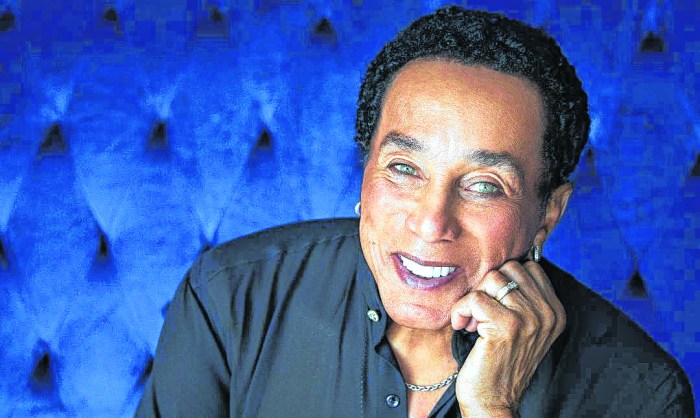In the 60-plus years that George Benson has been a professional musician, the Montreal International Jazz Festival has always held a special place in his heart dating back to the event’s humble origins in 1980.

(Photo by Austin Hargrave)
“I’ll be seeing musicians I haven’t seen in a long time because they’re coming from all over the world,” he said. “I’ve seen it grow from a nice event to an enormous event. One of my favorite photos is one of myself and Paco De Lucia and John McLaughlin. I love playing there very much.”

Having just turned 80 back in March, Benson shows no signs of slowing down. With 10 Grammys to his name starting back in 1977 with a trio for Best R&B Instrumental Performance, Best Pop Instrumental Performance and Record of the Year, the octogenarian musician has always straddled the jazz and pop worlds. His multi-generational appeal even found English virtual band Gorillaz seeking out his services for their 2018 cut “Humility.” It wasn’t necessarily an easy sell for Benson, who initially declined to participate when his manager forwarded the group’s request.
“I thought it was an African-American group and I told her there was no way I was going to be on a record with some cats called The Gorillas because it sounded so ridiculous,” he recalled. “When I found out they were a Caucasian group from England, I had no idea what was going on so I told her to send me the music. I didn’t hear anything I could shine on or make sound better so I didn’t want to waste any body’s time. I said I couldn’t do it because I couldn’t find anything that meant anything. They asked her to have Mr. Benson put anything on there because they just wanted my sound. They sent me another song that sounded worse than the first song to me, so I went back to the first song. I went into the studio and told my engineer, ‘Turn it up man. I want to feel it live with the band.’ I reached over and turned the knob up myself and I knew exactly what to do then because I put myself in the band and played it as if we were all live. I think that’s what worked.”
A former child prodigy whose earliest musical memory was hearing holiday music in a local Pittsburgh department store when his mom took him Christmas shopping when he was around five, Benson picked up a ukulele when he was about seven before switching to guitar the following year. By the age of 21 he was a hired hand in jazz organist Jack McDuff’s band before recording 1964’s The New Boss Guitar, Benson’s debut as a leader. And while he always had a foot in both the pop and jazz camps, it wasn’t until 1976’s Breezin’ where he had a commercial breakthrough. Benson’s fifteenth studio outing topped the jazz, pop and R&B charts, was certified triple platinum and became one of the best-selling jazz albums of all time. And while hard-core jazzbos might sniff at Benson allegedly selling out, he has no regrets and is happy to indulge his fans when he hits the stage.
 “I learned a long time ago that if you don’t want to play hits, don’t record them, because you’re going to have to play them,” he said with a laugh. “I remember the years when we didn’t have any hits, we were playing to very small audiences in nightclubs. There’s a great difference. When I saw my friends like Wes Montgomery, Jimmy Smith and some others that had hits in one case, the place where you had musicians say they weren’t going to play one hit or another ever again. I thought to myself that if I ever had a hit, I’d play it because that’s what the people are coming to hear—I knew that for certain. ‘This Masquerade’ changed my whole life. It won Record of the Year at the Grammy Awards. From that moment on, my life has not been the same. I didn’t imagine that I would have any more hits after that. I got one hit and that was good. Twenty-six hits later—our lives are pretty solid and we have a great place in history.”
“I learned a long time ago that if you don’t want to play hits, don’t record them, because you’re going to have to play them,” he said with a laugh. “I remember the years when we didn’t have any hits, we were playing to very small audiences in nightclubs. There’s a great difference. When I saw my friends like Wes Montgomery, Jimmy Smith and some others that had hits in one case, the place where you had musicians say they weren’t going to play one hit or another ever again. I thought to myself that if I ever had a hit, I’d play it because that’s what the people are coming to hear—I knew that for certain. ‘This Masquerade’ changed my whole life. It won Record of the Year at the Grammy Awards. From that moment on, my life has not been the same. I didn’t imagine that I would have any more hits after that. I got one hit and that was good. Twenty-six hits later—our lives are pretty solid and we have a great place in history.”
George Benson will be appearing on June 29 at the Montreal International Jazz Festival. Visit www.montrealjazzfest.com for more information.
Ever the consummate jazz fan, the Pennsylvania native was more than happy to share a trio of his favorite string-benders.

(public domain)
Charlie Christian
(July 29, 1916 to March 2, 1942)
“I like Charlie Christian. He didn’t play like any guitar players I’d heard before—he was completely different. He had a great sound and he was very original. And he could swing hard. I loved that about him.”
 Grant Green
Grant Green
(June 6, 1935 to January 31, 1979)
“No matter what he played, it had a bluesy effect that gave it a good grounding and it sounded like it came from the streets. That’s where the people lived—on the streets.”

(Photo by Chuck Stewart/public domain)
Wes Montgomery
(March 6, 1923 to June 15, 1968)
“I love Wes Montgomery. He played with a certain sophistication and he was a true jazz guitar player but he made everything sound good. His pop music sounded excellent too.”

































